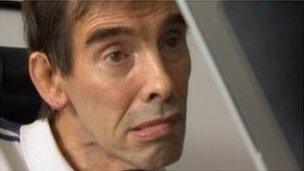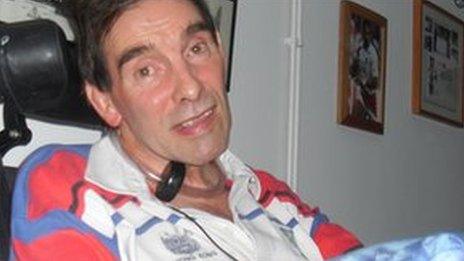Assisted dying debate: Tony Nicklinson in his own words
- Published

Tony Nicklinson is asking the High Court for a doctor to be allowed to lawfully end his life
Tony Nicklinson was left paralysed and with locked-in syndrome by a stroke seven years ago.
The 58-year-old wants a doctor to be able to lawfully end his life. A four-day hearing into his case is being heard at the High Court.
Here Mr Nicklinson, from Wiltshire, explains why he wants to change the current law on murder and euthanasia.
I have locked-in syndrome and it makes my life a living nightmare.
I cannot speak and I am also paralysed below the neck, which means I need someone to do everything for me.
For example, 90% of itches have to be endured because by the time someone comes to scratch it and I have laboriously explained where it is, the itch has gone. Now I just put up with them.
Or there is the screaming frustration of wanting to make a point but knowing that the only way I can express my opinion, by the board or computer, are useless in normal conversation.
Another example is having your teeth cleaned by someone else. It is a horrible experience and I doubt you would want it done more than once a day. I could go on.
'Murder law'
However, all these things are physical and arguably one can learn to live with them. What I find impossible to live with is the knowledge that, unlike you, I have no way out - suicide - when this life gets too much to bear.
I do not say these things to get your sympathy but to get justice.
It cannot be acceptable in 21st Century Britain that I am denied the right to take my own life just because I am physically handicapped.
Assisted dying is a controversial issue which aims to help people to die who are physically unable to take their own life or who can take their own life but want help to do so.
I must declare an interest because I am unable to take my own life. I require amendment to the murder law to make it lawful in certain circumstances for one person to take another's life (euthanasia) and [this] is the substance of my imminent court hearing.
Despite moments of gloom at the enormity of my task, I am kept going by the fundamental injustice of my circumstances and the need for change so that others won't have to endure such indignities if they don't want to.
We are all individuals and each person deserves an individual solution to his particular circumstances. A one-size-fits-all solution of better care and more of it, such as opponents advocate, is clearly not the answer. The option of assisted dying should be available.
It is astonishing that in 1969 we could put a man on the Moon yet in 2012 we still cannot devise adequate rules governing assisted dying.
'Apocalyptic future'
Many opponents of assisted dying object because they think it is wrong to take your own or another's life. Recently I asked such people if there was anything I could say to make them change their mind. They both replied there wasn't.
I even suggested to one some safeguards for his approval or otherwise. He totally ignored the question. Clearly any discussion with them is a complete waste of time.
Much has been said about the part care plays in assisted dying and the argument is essentially that better care and more of it will expunge all thoughts of taking one's own life.
This was said of me on a prestigious national radio programme back in February. I invited the speaker to visit so that she could tell me to my face what I am missing. So far all she has come up with is a number of excuses not to visit. Draw your own conclusions.
The only argument used by the opponents that I can see is to paint an apocalyptic picture of the future if assisted dying is legalised.
They often use Holland as the way it would be in the UK, with 10 and 12-year-olds asking for and getting help to die and old people being killed without them asking for it. All this and more is apparently done with the blessing of the population and with the authorities turning a blind eye to this orgy of unlawful killing.
Curiously these opponents fail to explain why we should adopt a flawed system instead of learning from their mistakes.
One aspect of the opponents' argument that makes my blood boil is the twisting of facts in order to scare ordinary people. This is illustrated by the following story.
'Mobile euthanasia vans'
Last week an opponent told me in a dark, conspiratorial voice that in Holland they even had mobile euthanasia vans supposedly touring neighbourhoods looking to drum up business like an ice cream van.
The truth is that the Dutch do indeed have such vans. They are mobile offices and are necessary because there are only so many doctors licensed to conduct assisted dying, so they go where requested to save elderly patients from having to travel to a clinic. Not quite the sinister purpose opponents would have you believe.
In short, don't take anything an opponent might say at face value - they can't be trusted.
For most people the debate is often remote from ordinary lives but for me, the debate on assisted dying is truly a matter of (an unhappy) life and (a pain-free) death. The next stroke could affect you or a loved one; would you be happy to end up like me?
- Published19 June 2012

- Published27 March 2012
- Published12 March 2012
- Published23 January 2012
